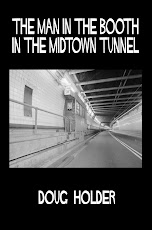Interview with Somerville Poet Afaa Michael Weaver
Afaa M. Weaver is a Somerville poet, playwright and educator. He is a veteran of 15 years as a blue collar worker in the city of his birth Baltimore, Maryland. He received a National Endowment for the Arts fellowship for poetry while working in factories. He eventually got his MFA degree from Brown University. He is a member of the inaugural faculty of the first workshop retreat for African American poets, and is currently a professor of Literature at Simmons College in Boston. He recently edited These Hands I Know: African-American Writers on Family, finished the poetry collection Multitudes, Plum Flower Dance, as well as writing plays and journalistic pieces. Weaver won the 2008 Pushcart Prize for poetry. I talked with Afaa on my show Poet To Poet: Writer To Writer on Somerville’s Cable Access TV.
Doug Holder: Who influenced you, and what spurred you on to write poetry?
Afaa M. Weaver: Oh, the usual adolescent turbulence I suppose. In 1974 I met Lucille Clifton. She lived in Baltimore. She and Dr. Valerie Sedlack from Morgan University were my mentors. Our relationship continues today.
My influences were Langston Hughes, Conrad Aiken, who edited "Poetry of the Negro"
for the Library of American Poetry series.
DH: Do you label yourself as an African-American writer?
AMW: I do consider myself an African-American writer. My particular take on that is if I embrace that, I also embrace my chances of freedom. If I spend time dancing around it, in a very ironic way, it will capture me.
DH: You edited an anthology These Hands I Know… How does this differ from other anthologies of this type?
AMW: It is the first anthology of its kind. The first anthology of poetry and prose writers, primarily fiction writers, to deal with the subject of the Black family. African-American culture is very insular and closed because of the history of racism and slavery. We could not afford to reveal our private self to the world due to physical danger…even to this day. We’ve had to hold back because of the precarious position that we are now in as a culture. Some of us are not doing well. We can affirm our own humanity for ourselves and the rest of the world by letting some of our self loose on the rest of the world. We can let them know we do see ourselves as human beings contrary to opinion of other people. We do have a very human life.
The media for a very long time would not take stories of romance involving black people because of the misconception they didn’t have a romantic life. It was viewed as purely carnal. I am looking at the early development of musicals in this country. Today,
choices are still made along color lines. I am addressing a unbalanced system.
DH: Personally, do you experience racism in this so-called "Athens of America"
AMW: Yes. When I go to Harvard Square I just sense the way people respond to me.
Some times it is too much, and I don’t even go there. I don’t like walking into stores and see people respond in thinly veiled dread and panic when I walk through the door. This happens in HARVARD SQUARE, the center of liberalism and privilege.
I enjoy Somerville. It has the eclectic and diverse nature that makes it for me. I like have a Peruvian cafe down the block, or a Asian grocery store around the corner.
DH: In your poetry collection Multitudes your poetry deals with the ying and yang of your relationship with your father. Can you talk about this?
AMW: My father passed away this Spring. The poems I have written about him, gave me a way to talk with him. My father and I had the same challenges in our relationship as any father and son have when they deal with the old world of doing things and the new world of doings. It made it difficult to talk with my father.
It was a loving relationship. My father was not a communicator of feelings. I couldn’t say: " You know pop, let’s sit down and process this."
DH: Can you trace your development as a writer?
AMW: I say poet. I was a freelance journalist while I worked in factories. I wrote for the Baltimore Sun. I started a small press magazine called " Blind Alleys" with Melvin Brown, a Baltimore poet. It was eight and a half by eleven--fold over with staples. We were pretty productive. We had book reviews of our work, etc… But by 1985 I couldn’t sustain it, while making the transition from the factory to academia. I signed a contract for my first book while I was in the factory, and I applied to brown University. I was working in the factory for ten years, and I told my fellow workers: " you know I am getting out of here." They said: "No, you are going to die here with the rest of us." I said: No, I am not." When I got my NEA Grant--I left the factory for good. So I guess poetry is what did it for me.
DH: Do you think teaching is a hindrance e to your work?
AMW: I think it helps. There is nothing like the exchange that goes on in the classroom. I really enjoy helping someone find their voice, or appreciate poetry. Committee meetings and academic stuff doesn’t help me. Hey, it still beats the factory!
DH: What is it about Somerville that attracts so many writers?
AMW: You have the space to be eccentric.
Wednesday, July 16, 2008
Subscribe to:
Post Comments (Atom)

No comments:
Post a Comment